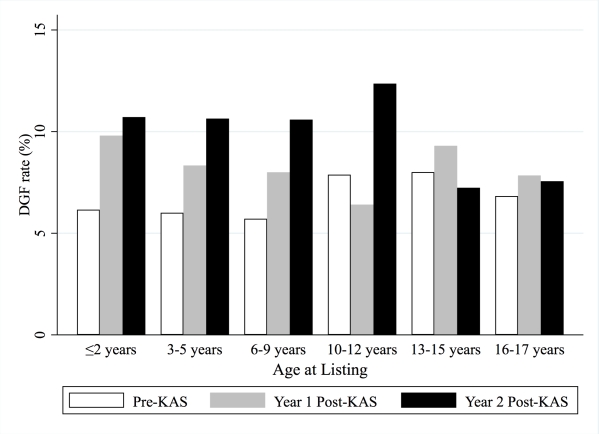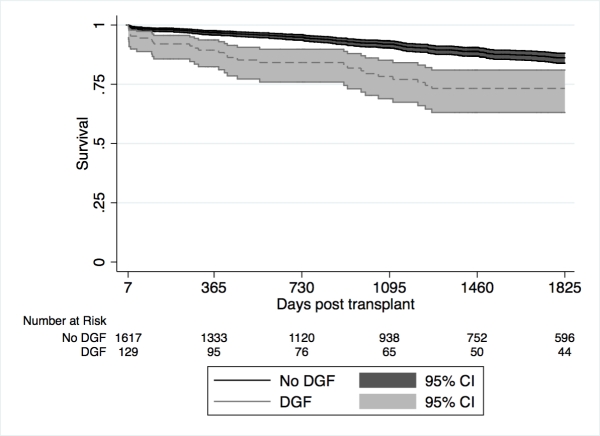Impact of the Kidney Allocation System on Young Pediatric Recipients
1University of Chicago, Chicago, IL
2Stanford University, Palo Alto, CA.
Meeting: 2018 American Transplant Congress
Abstract number: 425
Keywords: Kidney, Public policy, Survival
Session Information
Session Name: Concurrent Session: Kidney Deceased Donor Allocation - 2
Session Type: Concurrent Session
Date: Tuesday, June 5, 2018
Session Time: 2:30pm-4:00pm
 Presentation Time: 2:42pm-2:54pm
Presentation Time: 2:42pm-2:54pm
Location: Room 6E
Purpose: The Kidney Allocation System (KAS) altered the priority of pediatric candidates for deceased donor kidney transplantation. Before long-term graft outcomes can be assessed, Delayed Graft Function (DGF) may be a useful surrogate marker to assess the impact of KAS on pediatric candidates.
Methods: UNOS data from 2006-2016 were collected on deceased donor kidney transplants to pediatric recipients. A propensity score based on recipient characteristics was used to match pediatric recipients pre- (2010-2014) and post-KAS (2014-2016) and estimate the adjusted change in DGF. A semi-parametric decomposition analysis estimated the contributions of KAS-related changes in donor characteristics and dialysis time on DGF rate. Finally, the association of DGF with graft survival was determined using a proportional hazards model.
Results: The odds of DGF were 69% higher post-KAS for young (<10 years at listing) pediatric recipients (N= 1,153, p=0.024) but were not significantly increased for older pediatric (10–17 years at listing) recipients (p=0.477). In propensity score matched cohorts of young recipients, KAS increased the odds of DGF 71% (OR 1.71, 95% CI 1 1.01-2.46). In decomposition analysis, 24% of the higher DGF rate post-KAS was attributable to older donor age and 19% to increased recipient dialysis time. In survival analysis, unadjusted five-year graft survival of young pediatric recipients with DGF was significantly lower than non-DGF recipients (73% vs. 86%, p<0.01). DGF was associated with 2.2 times the risk of graft failure (aHR 2.3, 95% CI 1.5-3.5) amongst young pediatric recipients.
Conclusion: With the deceased donor kidneys offered under KAS, young pediatric recipients have higher rates of DGF and wait longer on dialysis. DGF leads to worse graft survival in young pediatric recipients. Allocation changes should be considered.
CITATION INFORMATION: Parker W., Ross L., Thistlethwaite J., Gallo A. Impact of the Kidney Allocation System on Young Pediatric Recipients Am J Transplant. 2017;17 (suppl 3).
To cite this abstract in AMA style:
Parker W, Ross L, Thistlethwaite J, Gallo A. Impact of the Kidney Allocation System on Young Pediatric Recipients [abstract]. https://atcmeetingabstracts.com/abstract/impact-of-the-kidney-allocation-system-on-young-pediatric-recipients/. Accessed February 24, 2026.« Back to 2018 American Transplant Congress


